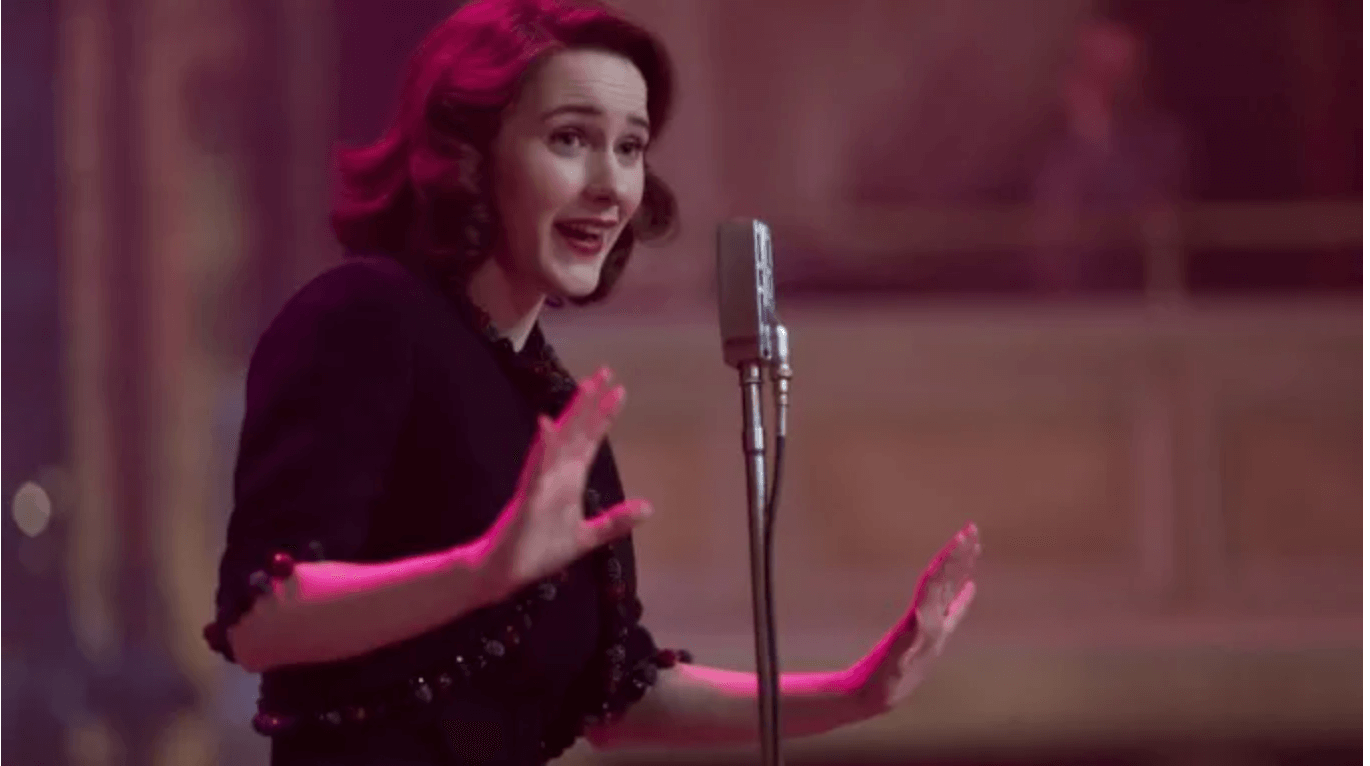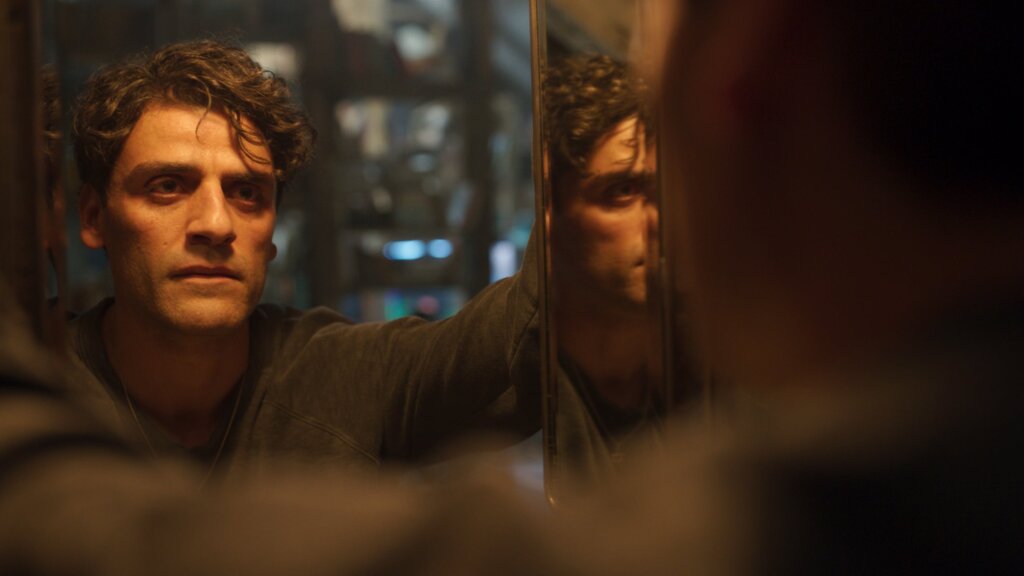The greatest Jewish superhero on television isn’t who you think it is
Moon Knight’s superpowers pale in comparison to the skills of a stand-up comedian

Superhuman strength is impressive, but have you ever tried to tell jokes to drunks in a burlesque club? Photo by Amazon
Stop me if you’ve heard this one.
A Jew and a Gentile walk into a bar and see a muscular man in a bodysuit and cape throwing back a drink.
“What will you have, gents?” the bartender asks.
Pointing to the caped figure, the Gentile replies, “I’ll have what he’s having.”
Pointing to the Gentile, the Jew whispers “And I’ll have the distribution rights to what happens next.”
This lame joke came to mind more than once while I watched the most recent entry into the Marvel Cinematic Universe, the Disney+ “Moon Knight.” As with every other MCU film or series over the past decade, I watched the six episodes with Louisa, my superhero guide and super child, who provided the color commentary.
Forward readers will not be surprised to learn that our expectations for this series were greater than for other MCU productions. Louisa and I did not screen the episodes so much as scrutinize them. Like Spector’s love interest, the archaeologist Marlene Alraune, we poked through the scenes and script, searching for Jewish signs.
We were, in a word, Jew-spotting — or, better yet, Super Jew-spotting. Marc Spector — aka Moon Knight — was enslaved not just to Khonshu, the Egyptian moon god, but also to the show’s Jewish viewers. We wanted him to exercise his powers to defend the innocent, naturally, but we wanted him to do so, well, Jewishly.
Of course, the notion of “Jewishness” is as knotty as those of a multiverse and Infinity Stones. Still, you know it when you see it. Or, at least, Louisa and I do. And by the end of the last episode of “Moon Knight,” we saw little that was clearly or convincingly Jewish. Instead, we glimpsed a Star of David dangling from the neck of Oscar Isaac (who plays Spector and his alternate self, Steven Grant); we winced at an overwrought scene of Isaac pounding a kippa against the pavement, then kissing it; and we squinted at a stilted tableau of a shiva for the superhero’s mother.

But these scenes were incidental, not essential to Spector’s character. It was as if management, long after production had begun, had sent a memo to the screenwriters: “Meant to tell you that Spector is Jewish.” If these scenes seemed tacked on, there is good reason. When the comic book was first launched, Louisa explained, the character of Marc Spector wasn’t Jewish. Only after several issues had already appeared did the writers decide to retrofit him with a Jewish identity.
Then, Louisa and I realized, with a shock that could give one a case of dissociative identity disorder, that we had been looking in the wrong place for a Jewish superhero. Such a character had nothing to do with Marvel and everything to do with Marvelous — as in Miriam “Midge” Maisel — aka the Marvelous Mrs. Maisel. It turns out that Midge, not Moon Knight, embodies a true Jewish superhero.
The Marvel character flexes powers that have everything to do with gentile superheroes — leaping over tall pyramids, deflecting speeding bullets and flying every now and then — and little to do with Jewish superheroes. The superpower of “The Marvelous Mrs. Maisel,” on the other hand, is quintessentially Jewish. Why? She is funny. Leaving aside the laughably vast literature on Jewish humor, we need only consult the good folks at the Pew Research Center. In a recent survey, they discovered that 42 percent of American Jews consider humor to be an essential Jewish characteristic. (Funny fact: this equals the percentage who believe caring for Israel is a core Jewish trait.)
As for Midge, she is not just funny; she is so funny that she “kills.” Yes, this is a figure of speech, one that Midge and her sidekick, Susie, repeatedly use. But it is also speech that figures into our actual response to jokes. As Alan Alda observed, “When you make people laugh, you make them helpless. So, in a way, you are killing them.”
Thanks to her slashing wit, Midge notches a body count that dwarfs Magneto’s, though, unlike Magneto, she tends to leave most of her victims with a smile. But not always. Like many other Marvel superheroes, Midge at first cannot control her power. It gets away from her, a death ray gone berserk. As a result, she alarms and often harms those she loves. Like Wolverine, who cannot control his claws as they kill his friend Rose, or the Hulk, who treats his fellow Avenger Thor like a rag doll, the Marvelous Mrs. Maisel “kills” not just paying customers, but most of her family and friends with jokes she cannot fully master.
Tellingly, Midge discovers her superpower in the 1960s, the same decade that another female superhero, Ms. Marvel, also stumbles into her superpowers. Both the Marvelous Mrs. Maisel and Ms. Marvel — subsequently promoted to Captain Marvel — confront an America undergoing seismic social and political changes. Both their lines of work—the comedy club and the Air Force— are professions where men rule and women serve (brisket in Midge’s case).
In both these professions, a woman would need, well, superpowers to get ahead. Remarkably, both Mrs. Maisel and Ms. Marvel share several of those gifts. Just as the latter, according to the official Marvel site, possesses “energy blasts, superhuman durability and superhuman strength,” so too does the former. How else could a woman not just survive but thrive onstage, while also holding down jobs as a mother, full-time switchboard operator and cosmetics counter clerk, and part-time lawbreaker?
Obviously, Mrs. Maisel does not have Ms. Marvel’s power to fly. If she could, she would not have needed Shy Baldwin’s plane to play Europe. Instead, she was left on the tarmac in New York. Midge had been punished for, once again, failing to control her comic superpower when she had earlier outed Shy onstage. She “killed” the audience, but also wounded Shy. Yet she did fly when, several months later, she confronted Shy in a men’s bathroom — don’t ask — and, with piercing wit, pierced our hearts with both her confession as a friend and profession of faith as a comedian.
Only a superhero could do this. And so, here we are: the Marvelous Mrs. Maisel and Ms. Marvel walk into a bar where you were tossing back a drink. With which superhero would you want to drink the next round?
The Forward is free to read, but it isn’t free to produce

I hope you appreciated this article. Before you go, I’d like to ask you to please support the Forward.
Now more than ever, American Jews need independent news they can trust, with reporting driven by truth, not ideology. We serve you, not any ideological agenda.
At a time when other newsrooms are closing or cutting back, the Forward has removed its paywall and invested additional resources to report on the ground from Israel and around the U.S. on the impact of the war, rising antisemitism and polarized discourse.
This is a great time to support independent Jewish journalism you rely on. Make a gift today!
— Rachel Fishman Feddersen, Publisher and CEO
Support our mission to tell the Jewish story fully and fairly.
Most Popular
- 1

Culture Cardinals are Catholic, not Jewish — so why do they all wear yarmulkes?
- 2

Fast Forward Ye debuts ‘Heil Hitler’ music video that includes a sample of a Hitler speech
- 3

News School Israel trip turns ‘terrifying’ for LA students attacked by Israeli teens
- 4

Fast Forward Student suspended for ‘F— the Jews’ video defends himself on antisemitic podcast
In Case You Missed It
-

Opinion This week proved it: Trump’s approach to antisemitism at Columbia is horribly ineffective
-

Yiddish קאָנצערט לכּבֿוד דעם ייִדישן שרײַבער און רעדאַקטאָר באָריס סאַנדלערConcert honoring Yiddish writer and editor Boris Sandler
דער בעל־שׂימחה האָט יאָרן לאַנג געדינט ווי דער רעדאַקטאָר פֿונעם ייִדישן פֿאָרווערטס.
-

Fast Forward Trump’s new pick for surgeon general blames the Nazis for pesticides on our food
-

Fast Forward Jewish feud over Trump escalates with open letter in The New York Times
-
Shop the Forward Store
100% of profits support our journalism
Republish This Story
Please read before republishing
We’re happy to make this story available to republish for free, unless it originated with JTA, Haaretz or another publication (as indicated on the article) and as long as you follow our guidelines.
You must comply with the following:
- Credit the Forward
- Retain our pixel
- Preserve our canonical link in Google search
- Add a noindex tag in Google search
See our full guidelines for more information, and this guide for detail about canonical URLs.
To republish, copy the HTML by clicking on the yellow button to the right; it includes our tracking pixel, all paragraph styles and hyperlinks, the author byline and credit to the Forward. It does not include images; to avoid copyright violations, you must add them manually, following our guidelines. Please email us at [email protected], subject line “republish,” with any questions or to let us know what stories you’re picking up.
















